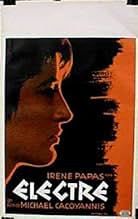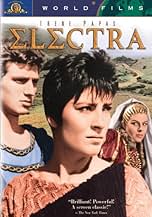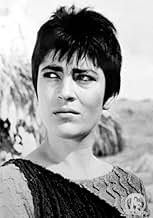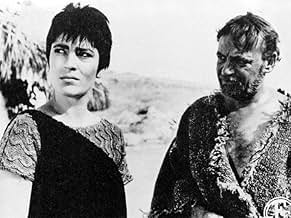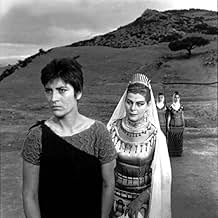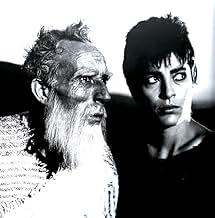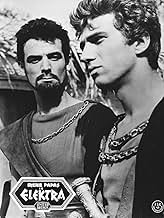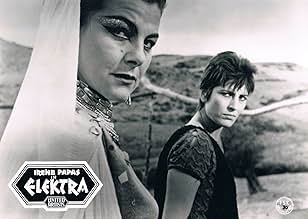VALUTAZIONE IMDb
7,6/10
1973
LA TUA VALUTAZIONE
Vivendo in esilio dopo la morte del padre, i figli adulti di un re assassinato e usurpato si uniscono per vendicarsi.Vivendo in esilio dopo la morte del padre, i figli adulti di un re assassinato e usurpato si uniscono per vendicarsi.Vivendo in esilio dopo la morte del padre, i figli adulti di un re assassinato e usurpato si uniscono per vendicarsi.
- Regia
- Sceneggiatura
- Star
- Candidato a 1 Oscar
- 11 vittorie e 2 candidature totali
Fivos Razi
- Aegisthus
- (as Phoebus Rhazis)
Recensioni in evidenza
An extraordinary film from a visual and dramatic standpoint, _Elektra_ unfortunately too often plays like a _Cliff's Notes_ version of Euripedes' work (although, in all fairness, I must note that the film is only "based on" the classical play). The essential structure is there: Agamemnon's murder, the banishment of Orestes, Elektra's marriage, the reuniting of the grown children, the double murder. But by clipping away much of the Euripedean dialogue, much depth of characterization is lost. The principles become one-dimensional, with only hints of the complexity which makes the story so overwhelming. However, the stark cinematography and fine acting make this film eminently watchable, particularly at the climatic matricide sequence.
I accidentally came across this film while looking through used DVDs at a local store. Having a passing interest in Greek myth, I bought it sight unseen. Far, far better than recent American and British attempts to retell (read remake) these great stories, this marvelous film stays fairly close to the original, telling a tale of betrayal and revenge. I've always loved the story of Orestes: damned if he doesn't avenge his father's murder, damned if he kills the chief assassin-his own mother. Elektra's story is woeful as well-driven by her own desire for vengeance, a vengeance she believes will never come, only seeing her own doom and the triumph of her father's murderers.
Wonderfully acted by Irene Pappas. I'm recommending it to all my friends.
Wonderfully acted by Irene Pappas. I'm recommending it to all my friends.
I have just seen this film again via DVD after first seeing it in a cinema 40 years ago, and it remains in my view a staggering masterpiece of world cinema. It is a film that should be compulsory viewing by all aspiring film-makers since it is, unlike so many of today's movies which really are over influenced by television, so cinematic it makes one positively nostalgic for concepts like film grammar and form. Cunningly, it is almost a silent movie with a wonderful soundtrack, and the acting, (outstanding by all concerned), shows the great value of body language, and how good film editing, the use of a superb musical score, and excellent black and white cinematography can convey such powerful and poignant emotions. The play on which it is based has of course the soundest of psychological under-pinnings; guilt is an emotion and state of mind that can ONLY be experienced once one has done something horrendous enough to make it possess you. It cannot be imagined or anticipated, and, even when "rational" thought seems to justify the act, as Elektra and Orestes find to their cost, this evaporates instantly once that rage has been quenched. The final sequence of this film, after the mother has been murdered, and when these realisations manifest themselves is so overwhelming and powerful that only the hardest of heart could not be profoundly moved. But, like all good psycho-therapy, it is ultimately sanctifying, even if at the same time it is heart-breaking and almost unbearably poignant. Certainly one of the best films I have ever seen in my life, and every department deserves the highest praise and congratulations. One of the very few films to which I have awarded a 10/10 vote.
As an adaptation of a two thousand year old Greek tragedy, Michael Cacoyannis' "Electra" is hard to beat, and I cannot imagine it being improved upon by any further attempt on it now: there is a stripped down starkness and simplicity to it that benefits it greatly, and lends it the haunting quality of myth that no amount of CGI could better.
It has immaculately brooding, glowing cinematography, unsurpassably shot amid the ancient stones of Mycenae itself, and the music by Mikis Theodorakis (of Zorba The Greek fame) is timeless and perfect.
If I had to point out any weaknesses at all, perhaps Irene Papas in the title role looks a little too 60s in her look, although her acting is fine. There's a couple of gaps in the narrative that should probably have been filmed and inserted, as their absence either weakens the drama or feels confusing. But these are small quibbles.
Several times while watching I found myself thinking it would make a good double bill with Orson Welles' Othello, as it feels cut from a similar cloth, though it is a better film for being less wordy. Recommended.
It has immaculately brooding, glowing cinematography, unsurpassably shot amid the ancient stones of Mycenae itself, and the music by Mikis Theodorakis (of Zorba The Greek fame) is timeless and perfect.
If I had to point out any weaknesses at all, perhaps Irene Papas in the title role looks a little too 60s in her look, although her acting is fine. There's a couple of gaps in the narrative that should probably have been filmed and inserted, as their absence either weakens the drama or feels confusing. But these are small quibbles.
Several times while watching I found myself thinking it would make a good double bill with Orson Welles' Othello, as it feels cut from a similar cloth, though it is a better film for being less wordy. Recommended.
Euripides pared to the essentials. Not one word, not one gesture is wasted. Nor is there ever an iota more than necessary.
A stark, spare study of despair in a sun blasted landscape that seems to watch over the pathetic efforts of humans with equal measures of timeless indifference and utter contempt. The characters in the story, the actors on the screen, and we in audience know what will happen next; but we are all powerless to prevent it. It is so intense that it makes Shakespeare's 'King Lear' seem almost frivolous.
It takes five minutes for the first two words to be spoken. 'Strike him!' Everything flows from that line. Another ten minutes of near silence passes before Electra appears. Her back to the camera, she turns to look over her shoulder - electricity is discharged. The audience gasps. Nothing is said but the implacable will is communicated. Nothing good is going to happen next.
It is almost a silent movie. They certainly have faces, to quote Gloria Graham from 'Sunset Boulevard.' By looks, by camera angles, by gestures, by the tensing of shoulders, the widening of eyes, make-up, fine photography, tight cutting, and very few words the tragedy unfolds.
It is always about Electra, to be sure, and Irene Pappas is a force of nature on the screen. She says little but each move, gesture, look, and word is supercharged.
Recommended for adults.
A stark, spare study of despair in a sun blasted landscape that seems to watch over the pathetic efforts of humans with equal measures of timeless indifference and utter contempt. The characters in the story, the actors on the screen, and we in audience know what will happen next; but we are all powerless to prevent it. It is so intense that it makes Shakespeare's 'King Lear' seem almost frivolous.
It takes five minutes for the first two words to be spoken. 'Strike him!' Everything flows from that line. Another ten minutes of near silence passes before Electra appears. Her back to the camera, she turns to look over her shoulder - electricity is discharged. The audience gasps. Nothing is said but the implacable will is communicated. Nothing good is going to happen next.
It is almost a silent movie. They certainly have faces, to quote Gloria Graham from 'Sunset Boulevard.' By looks, by camera angles, by gestures, by the tensing of shoulders, the widening of eyes, make-up, fine photography, tight cutting, and very few words the tragedy unfolds.
It is always about Electra, to be sure, and Irene Pappas is a force of nature on the screen. She says little but each move, gesture, look, and word is supercharged.
Recommended for adults.
Lo sapevi?
- QuizFilmed on location in Mycenae and Argos in 1961.
- BlooperHaving seconds thought about killing Klytaemnistra, Orestis proclaims a devil, not a god, must have spoken to the oracle who told him to seek vengeance. As it happens, the word "devil" comes from the Greek word diábolos which means slanderer or accuser, not the Christian or Islamic word for a supernatural enemy of humankind tempting people to commit evil deeds.
- Citazioni
Chorus Leader: My child, you must talk to the gods. They will hear you.
Elektra: No god hears me. No human being is listening to my prayers.
- ConnessioniFeatured in Storgi sto lao (2013)
I più visti
Accedi per valutare e creare un elenco di titoli salvati per ottenere consigli personalizzati
- How long is Electra?Powered by Alexa
Dettagli
- Tempo di esecuzione1 ora 50 minuti
- Colore
- Mix di suoni
Contribuisci a questa pagina
Suggerisci una modifica o aggiungi i contenuti mancanti


